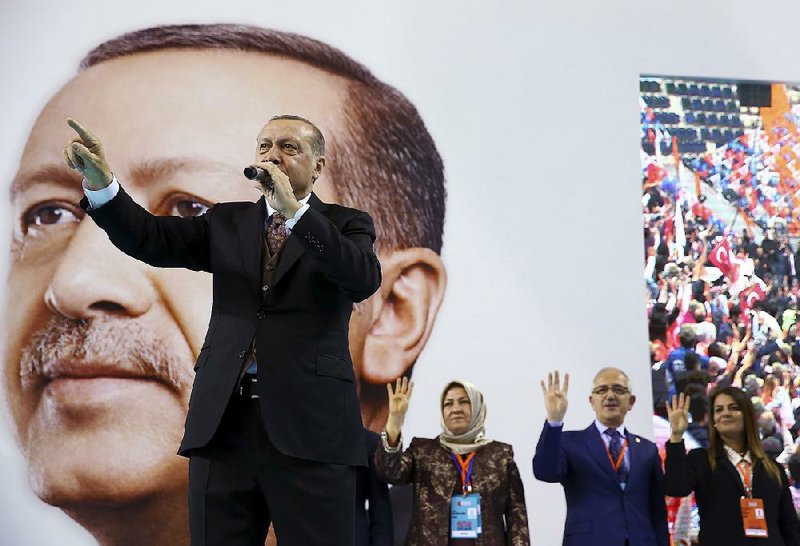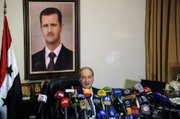BEIRUT -- Syrian government forces succeeded Saturday in their deepest push yet into the eastern suburbs of the capital, Damascus, cutting off a major highway that made it hard to move between three parts of the rebel-held area, and dealing a blow to opposition fighters who have vowed not to surrender.
Meanwhile, in an effort to repair tattered relations, President Donald Trump's administration has told Turkey that it will move to rein in Kurdish fighters who have been the backbone of the U.S. campaign against the Islamic State in Syria, according to U.S. and Turkish officials.
Syrian state media and an opposition monitoring group said government forces have laid siege on the rebel-held town of Harasta, cutting it off from the rest of the suburbs known as eastern Ghouta.
Britain-based Syrian Observatory for Human Rights said government forces have also cut off the main highway that links northern Ghouta with its southern parts, isolating the town of Douma, the largest in the area.
The government-controlled Syrian Central Military Media said troops captured the Kilani gas station on the main highway linking Douma with Harasta and those two areas with the rest of eastern Ghouta. Residents will have to rely on unpaved roads to move in eastern Ghouta, but that is difficult because of the intensity of shelling and airstrikes, activists said.
"The regime has cut Ghouta into three parts by cutting the main roads linking them," said the Observatory's chief, Rami Abdurrahman.
The government and its Russian backers, determined to wrest eastern Ghouta from rebel control after seven years of war, recently intensified the shelling and bombardment to clear the way for its troops to advance on the ground. Nearly 1,000 people have been killed in the past three weeks of relentless bombardment.
The Syrian Central Military Media said troops Saturday reached the center of the town of Misraba, adding that opposition fighters are crumbling in the offensive. Syrian state TV aired live footage from inside the town and saying that troops are a little more than half a mile from troops on the western side. Reaching them would physically cut northern parts of eastern Ghouta from its southern parts.
"The Syrian Arab Army soldiers marching from three sides could meet soon," Rabih Dibi, a reporter with state-run Ikhbariyah TV, said in his report from Misraba.
TV footage later showed dozens of men, women and children crowded in a basement in Misraba after troops captured the area. The TV station said authorities will move the nearly 60 people to a safe location where they will be given shelter and food.
"Once you came in we felt well," said one of the women in the basement. Another man said there were 15 families in the basement who have been hiding for days.
Ikhbariyah reported that government forces and their allies captured farms outside the village of Aftris and were marching toward the village. It added that troops were also moving toward the town of Jisreen on the southern edge of eastern Ghouta.
The Observatory reported that troops were advancing under the cover of attacks by warplanes and helicopter gunships, and confirmed that government forces captured large parts of Misraba.
"The bombing is so intense. Warplanes haven't left the skies for 24 hours," opposition activist Anas al-Dimashqi said via text messages from the rebel-held town of Kfar Batna. "The advance is the result of a scorched-earth policy."
Syria's deputy foreign minister Faisal Mekdad denied in a news conference held in Damascus opposition claims that government forces used poison gas in their attacks on eastern Ghouta.
Mekdad added that insurgents groups in eastern Ghouta are preparing "to fabricate" more such attacks to blame the Syrian army.
Maj.-Gen. Vladimir Zolotukhin, of the Russian center for reconciliation of the warring parties in Syria, said Saturday that negotiations were being conducted about the withdrawal of rebel fighters from Syria's besieged eastern Ghouta. He said rebel artillery fire from eastern Ghouta hit residential areas of the capital Damascus and its suburbs, killing at least one person.
"Tense negotiations continue between representatives of the Center ... leaders of the illegal armed formations of the Syrian opposition in order to reach an agreement on the withdrawal of the second line of militants from the zone of de-escalation of East Ghouta," he said, according to Russian news agencies.
Speaking Saturday on the U.S. promise to move Kurdish fighters in Syria, a senior Turkish official said the first step and "the crux of the matter" is to withdraw the Kurds from the Syrian town of Manbij and relocate them east of the Euphrates River. The town, about 25 miles from Turkey's border, has come to symbolize the fevered competition for territory and influence in northern Syria among the United States, Turkey and other regional powers.
The American pledge, if carried out, would satisfy a long-standing demand by the Turkish government and fulfill a promise first made by former President Barack Obama's administration to keep the Kurdish forces east of the Euphrates.
The Kurds helped to take Manbij from the Islamic State in 2016 and have been there since.
Turkey has shown no tolerance for any development that strengthens Kurdish political and military groups in Syria, especially along the lengthy border Turkey shares with Syria. Turkey accuses them of being "terrorists" seeking a permanent Kurdish enclave allied with separatist Kurdish militants inside Turkey, known as the Kurdistan Workers' Party.
Officials gave no timeline for moving the Kurds from Manbij to positions east of the Euphrates, 20 miles away, and did not indicate how the relocation would be accomplished. The officials said this would be discussed by newly established working groups from the U.S. and Turkish governments. The first session was held Thursday and Friday in Washington.
This tentative warming of relations, however, is already coming at a cost to the United States. Saying they feel let down by Washington, U.S.-allied Kurdish forces said they are withdrawing from the front lines of the fight against the Islamic State in southern Syria to join the battle against Turkey in the north.
The United States, which has pursued Islamic State forces with single-minded focus, has long insisted the Kurds were the most effective partners in the fight against the militants, despite Turkish complaints.
U.S. commanders on the ground in and around Manbij have previously warned that several hundred American troops deployed there would defend the Kurds against any attack by Turkish troops, now massed a few miles away. Turkish officials were angered last month when U.S. commanders touring the area with American journalists praised the Kurds and vowed to fight alongside them if there was a Turkish attack.
A shootout between two NATO members, both agree, would be catastrophic.
Turkey's president criticized NATO on Saturday for not supporting his country's ongoing military operation against Syrian Kurdish fighters in Syria.
President Recep Tayyip Erdogan, speaking to reporters Saturday, asked, "Hey NATO, where are you?" and accused the military alliance of double standards.
Erdogan said NATO member Turkey sent troops to conflict zones when requested, but did not receive support in return.
Turkey launched a solo military offensive against the Syrian Kurdish People's Protection Units on Jan. 20 to clear them from Afrin in northwestern Syria.
The country considers the group a terror organization, but its NATO ally, the United States, backs the fighters to combat the Islamic State group.
Erdogan urged NATO to go to Turkey's aid, saying its borders are "under threat right now."
Information for this article was contributed by Bassem Mroue and other staff members of The Associated Press; and by Karen DeYoung and Kareem Fahim of The Washington Post.
A Section on 03/11/2018


